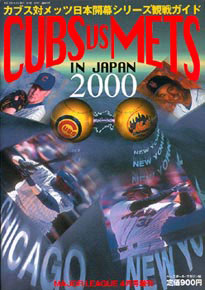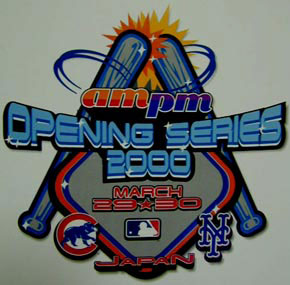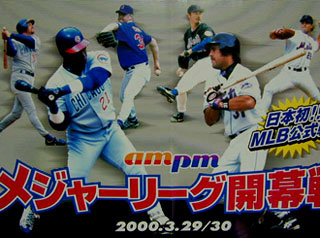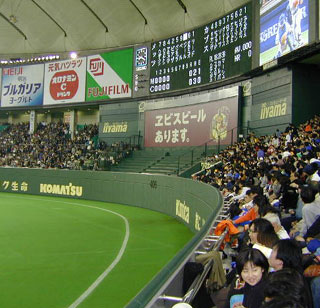Major League Baseball's Opening Series 2000 at Tokyo Dome
After wiping the morning drool off my chin, returning my bottle and smokes to my desk drawer, adjusting my tie, and checking to see that my shirt didn't stink too bad, I scanned the day's headlines.
 The paper was full of plenty of stories profiling the Opening Series 2000 of the Major League Baseball season. (The Cubs and Mets will be in town for a pair of games at Tokyo Dome.)
The paper was full of plenty of stories profiling the Opening Series 2000 of the Major League Baseball season. (The Cubs and Mets will be in town for a pair of games at Tokyo Dome.)
The press hacks from some of America's top rags and news services had obviously heavily researched their topic; articles were filled with a lot of unique items not typically mentioned in reference to Japan (sushi, kimono, bowing, friendliness) - a sure sign that these fellows were doing some serious legwork. But a few things puzzled me.
In talking about the reception the American players will receive in Japan, Shaun Powell of Newsday wrote: "They will get all the goods and none of the garbage. They will live the kind of public life every ballplayer craves. Right away, they will notice they are not in Chicago or New York anymore."
I called junior reporter Junko into my office.
"Well," she said, "I guess he is implying that, unlike American cities, the hookers and dope peddlers in Japan are found in neighborhoods that are absent of trash."
She then balled-up her fists.
"Boy, if I ever meet that Powell guy," she steamed, "I'd set him straight. Japan doesn't play second fiddle to anyone when it comes to trash in its areas of vice; Kabukicho and Shibuya have quite a bit, sometimes ankle-deep."
"Well," I offered, "maybe he doesn't consider vomit to be a part of trash."
"That would have to be it."
I fumbled around in my shirt pocket, pulling out the remnants of last night's poker game. "I got two ducats for Game 2 - you wanna go?"
Silence. Well, almost.
 A lack of crowd noise was the last thing the Cubs and Mets expected when they landed in the baseball land of the trumpet and noise maker, but that's what they got - at least until Benny Agbayani's slam pushed the Mets a 5-1 victory, giving them a split of this two-game Tokyo series.
A lack of crowd noise was the last thing the Cubs and Mets expected when they landed in the baseball land of the trumpet and noise maker, but that's what they got - at least until Benny Agbayani's slam pushed the Mets a 5-1 victory, giving them a split of this two-game Tokyo series.
Stripped of their drums and horns at the turnstiles, the capacity crowd of 55,000 was eerily quiet for most of this second game of the Opening Series 2000. But it was also a night that featured tempers, stopped streaks, and even - though at times a bit forced - some good old-fashioned Japanese baseball flavor.
It was a game of redemption for the Mets. The previous night featured an abysmal nine walks by Mets starting pitcher Mike Hampton and a pair of Cub home runs from Shane Andrews and Mark Grace, all keys to a 5-2 victory for the Cubs.
Pregame activities were in abundance, as were tempers. Before the ceremonial first pitch was lobbed over the plate by the first-ever Japanese player in the Majors, Masanori Murakami, Cubs manager Don Baylor moved out of the dugout and over to his opposite number, Bobby Valentine, for a friendly handshake. But Baylor held his hands at his sides, not acknowledging Valentine.
The tiff went back to the day before when Valentine played the game under protest. Baylor had made a mistake by leaving his reserve shortstop Jeff Huson off the lineup card. The protest was dropped when it was learned the shortstop was eligible to play; the feud, however, was just beginning.
But after flowers were given by kimono-clad women to members of both clubs, it was time to play ball.
 In the bottom of the first, Mets shortstop Rey OrdonezŐs streak of 101 straight games without an error - a Major League record - was halted when he failed to pick up a slow roller off the bat of Damon Buford.
In the bottom of the first, Mets shortstop Rey OrdonezŐs streak of 101 straight games without an error - a Major League record - was halted when he failed to pick up a slow roller off the bat of Damon Buford.
From there, the teams breezed through inning after inning; the main crowd noise coming only when either Cubs slugger Sammy Sosa or Hideo Nomo's former catcher, Mike Piazza, came to the plate. (Sammy became a huge star in Japan after he participated in the Major League All-Star tour of Japan after the 1998 season. Piazza's connection to Nomo landed him some lucrative endorsements for heavy equipment manufacturer Komatsu. These spots were obviously still fresh in the minds of all the tractor owners in the crowd. Note: Piazza's mane has been bleached.)
These were hardly the only recognizable faces. Mets hurler Masato Yoshii used to be a star with Japan's Kintetsu Buffaloes and Yakult Swallows. And Bobby Valentine is certainly remembered for his skippering of the Chiba Lotte Marines during their 1995 campaign.
Though Tokyo Dome is a world away for the both teams, it was not unfamiliar environs for either by game time. For one, both took their hacks inside the "Big Egg," as the Dome became known after its opening in 1988, over the course of the week against Tokyo's hometown favorites, the Yomiuri Giants. For another, it is modeled after dome stadiums in the U.S. in terms of both field dimensions and features. (For example, any player who has tried to find a fly ball in the milky roof of Minnesota's Metrodome will certainly find equal comfort in the white puffy cumulous clouds forming the Egg's.)
The Dome folks did their best to create a cozy American baseball atmosphere. In addition to endless streams of ear-bleedingly loud rock n' roll between batters, the sound system pumped out U.S. stadium favorites: the bugle music to indicate that the crowd should yell "Charge!" and the piano notes to "If You're Happy and You Know It."
 Even the classics were added. The Cubs broadcaster gave the fans his version of "Take Me Out to the Ballgame" in accompaniment to a translation in Japanese on the Dome's message board in the middle of the seventh. Sadly, though, the crowd wasn't interested. It could have very well been a case of him confusing them by not slurring his speech and waving the microphone out of the press box like his predecessor.
Even the classics were added. The Cubs broadcaster gave the fans his version of "Take Me Out to the Ballgame" in accompaniment to a translation in Japanese on the Dome's message board in the middle of the seventh. Sadly, though, the crowd wasn't interested. It could have very well been a case of him confusing them by not slurring his speech and waving the microphone out of the press box like his predecessor.
In spite of this, the Japanese element was not entirely swept under the Dome's green turf rug. Girls with fluorescent-colored backpacks cruised up and down the aisles, distilling Budweiser, Kirin, and Yebisu beer for 800 yen a cup. In the concession stands, eel on rice, sushi, curry dishes, rice bowls, and tempura were readily available.
During the fourth and seventh innings, one member of the right field seats tried to add a little traditional Japanese-style rooting to the game by chanting "Go, Go, Young! Go, Go, Young!" and "Go, Go, Rickey! Go, Go, Rickey!" when Eric Young and Rickey Henderson reached base, respectively. (It is standard for extensive synchronized rooting to take place in the outfield cheering sections. Flags, trumpets and noise-makers are used during the renditions of these carefully practiced chants.)
This fan was then, after quite a few cups of sake, encouraging the players to steal a base in true Japanese tradition. After both players did indeed successfully swipe the bags, the sage in right field was the king of the bleachers with another well-deserved cup in his hands - "Kampai!"
At the end of nine innings, the game stood at a 1-1 tie. All the scoring took place in the fifth: a wild throw by Mets third baseman Todd Zeile led to the Cub run; and two walks and a sacrifice fly by Rickey Henderson gave the Mets their single tally.
But that all changed in the eleventh.
After leaving the bases loaded in the bottom of the tenth, the Cubs called upon Danny Young, a rookie with nine years of minor league mileage under his belt, to pitch the eleventh. With two outs, Young yielded a single to Zeile and walks to Ordonez and Melvin Mora. This set the stage for Agbayani, who slugged a homer to center to give the Mets a lead they would not relinquish.
When Armando Benitez then closed out the bottom of the frame, ensuring a split of the series for the Mets, Valentine came out onto the field and tipped his cap to the appreciative Japanese crowd. And Baylor was nowhere to be found.

